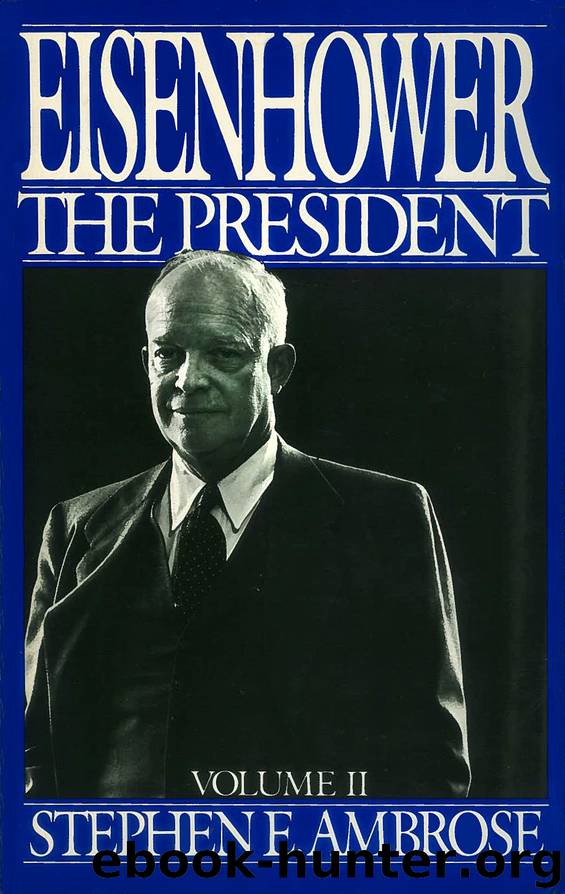Eisenhower Volume II by Stephen E. Ambrose

Author:Stephen E. Ambrose
Language: eng
Format: epub
Published: 2018-12-10T16:00:00+00:00
CHAPTER FOUR
The Chance for Peace
April 1–June 30, 1953
E ISENHOWER, ACCORDING TO C. D. Jackson, suffered from an “exaggerated desire to have everybody happy,” which prevented him from making “clean-cut decisions.” 1 The case of the generators for the Chief Joseph Dam was one example. It was hardly a major issue, although Eisenhower and his Cabinet spent hours discussing it, but it was illustrative of Eisenhower’s willingness to abandon principle when faced with practical problems or political resistance. The case involved procurement of generators for the dam, which was being built by the Corps of Engineers. To Secretary Wilson’s consternation, a British firm came in 12 percent below the lowest American bidder, Westinghouse. Wilson refused to make a decision to award the contract to the British (Wilson’s habit of bucking his decisions up to Eisenhower was already causing the President much anguish, leading Eisenhower to wonder to his aides how a man who was so hesitant to take control could ever have run General Motors). 2 At a Cabinet meeting in early March, Wilson had outlined his problem. Westinghouse wanted the contract badly, he said, and the Corps of Engineers was arguing that maintenance was easier on American equipment. On the other hand, Wilson knew that Eisenhower was committed to free trade, and that the President wished to strengthen the economies of the NATO allies. And of course there were budgetary considerations—a significant sum of money could be saved by buying British. Wilson concluded his presentation, then said, “Well, Mr. President?” Eisenhower replied, “Well, just shooting from the hip, I’d say to give the order to the British.” 3
A month later Wilson still had not placed the order. The Cabinet took up the subject again. Dulles reminded Eisenhower that the NSC had made a decision to encourage procurement abroad. Stassen and Lodge warned that the British were watching this one closely, to see if Eisenhower really was committed to free trade. Eisenhower said, “My own mind is made up on what is right in the long term. But if the protectionists can exploit this case, we’d be foolish to do it.”
On the other hand, he added, “If we can do it without trouble, let’s do it, because I can see no excuse for us to be a high-protectionist country.” Brownell reminded him that the bill extending the Reciprocal Trade Agreements Act was before Congress, that most Republicans opposed extension, and that giving the contract to the British would increase anti-RTAA sentiment. But Dulles told the President, “We’ve got to lead on this one. We can’t bend to the ‘Buy American’ cry.” Eisenhower responded that “it is not a matter of courage; I’m just wondering about the effect.” “Exactly,” Dulles said. “Without our leadership we can’t expect Congress to favor RTAA.” Eisenhower pointed out that “if we’re going to do anything at all about building up foreign economies, we’ve got to buy foreign someplace along the way.” Nixon warned about the political effect; Wilson said Westinghouse would be hurt if it lost the order.
Download
This site does not store any files on its server. We only index and link to content provided by other sites. Please contact the content providers to delete copyright contents if any and email us, we'll remove relevant links or contents immediately.
| U.K. Prime Ministers | U.S. Presidents |
Waking Up in Heaven: A True Story of Brokenness, Heaven, and Life Again by McVea Crystal & Tresniowski Alex(37047)
Empire of the Sikhs by Patwant Singh(22215)
We're Going to Need More Wine by Gabrielle Union(18119)
Hans Sturm: A Soldier's Odyssey on the Eastern Front by Gordon Williamson(17071)
Leonardo da Vinci by Walter Isaacson(11962)
The Radium Girls by Kate Moore(10958)
Educated by Tara Westover(7105)
Tools of Titans by Timothy Ferriss(7014)
How to Be a Bawse: A Guide to Conquering Life by Lilly Singh(6734)
The Last Black Unicorn by Tiffany Haddish(5101)
Permanent Record by Edward Snowden(5044)
The Rise and Fall of Senator Joe McCarthy by James Cross Giblin(4864)
Promise Me, Dad by Joe Biden(4489)
The Wind in My Hair by Masih Alinejad(4451)
The Crown by Robert Lacey(4135)
A Higher Loyalty: Truth, Lies, and Leadership by James Comey(4070)
The Iron Duke by The Iron Duke(3673)
Joan of Arc by Mary Gordon(3289)
How to be Champion: My Autobiography by Sarah Millican(3208)
